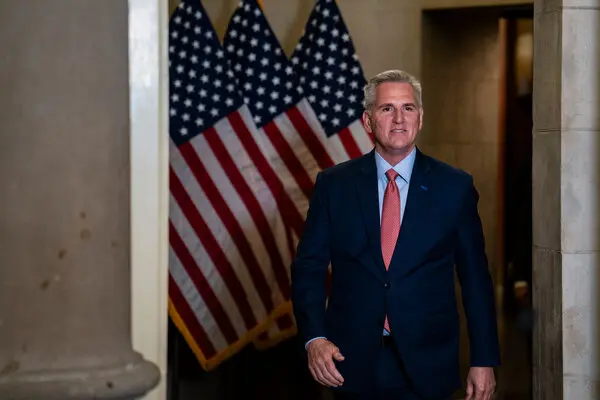Newsmatro

A growing divide has become evident between Washington’s political upheaval and the mounting economic worries facing Americans at their kitchen tables. President Joe Biden grapples with an impeachment inquiry, while House Speaker Kevin McCarthy confronts internal challenges within his own party.
This stark contrast between D.C.’s spiraling political showdowns and the overwhelming economic anxiety across the nation reflects a public sentiment explored in a recent exclusive poll sponsored by Suffolk University’s Sawyer Business School.
The ramifications of this disconnect extend beyond mere optics, impacting both Washington and Main Street. The likelihood of a partial government shutdown at the end of the month has increased, posing a failure of the fundamental task entrusted to those in power: maintaining the functioning of the government.
A government shutdown would not only result in the furloughing of millions of federal employees and the closure of essential agencies but also add stress to an economy already grappling with various challenges. Moreover, it could erode confidence across the nation in the capacity of the nation’s leaders to address or even comprehend the pressing concerns of citizens.
Pressure from the hard-right Freedom Caucus led McCarthy to take an unexpected step on Tuesday − initiating an impeachment inquiry without the prior House vote − in a bid to persuade his party members to approve short-term government funding. However, success in this maneuver is far from guaranteed.
White House officials argue that President Biden has remained focused on bolstering the workforce and expanding the middle class, asserting that the economy is in better shape than many Americans perceive. The administration has embarked on renewed efforts to convey this message, embracing the term “Bidenomics” and highlighting the robust job market and the recent easing of inflation. The goal is to achieve a “soft landing” that curbs rising costs without tipping the economy into recession.
However, these positive narratives contrast starkly with the reality that Americans have conveyed about their own lives. When asked to describe the state of the economy, 75% of survey respondents volunteered words conveying trouble, such as “sad,” “struggling,” “dismal,” “disaster,” “crashing,” and “confusing.” A significant majority, 70%, believe the economy is deteriorating, not improving.
Consequently, President Biden bears a substantial share of responsibility in the eyes of many Americans for the challenging economic conditions they currently face. A significant majority, 59%, disapprove of his handling of the economy, and 47% have more trust in former President Donald Trump’s ability to improve it.
The poll, conducted from September 6 to 11 and encompassing 1,000 adults through landline and cellphone interviews, carries a margin of error of plus or minus 3.1 percentage points.
With President Biden’s approval ratings on a downward trajectory and widespread concerns about his age, Democratic operatives and allies are quietly discussing the prospect of whether he should seek re-election, with some advocating for alternative candidates like Vice President Kamala Harris to compete in next year’s primaries.
For Republicans, there are also risks on the horizon. House Republicans, notably the Freedom Caucus, are at odds over spending bills and their expectations of Speaker McCarthy. If McCarthy pursues short-term funding solutions, it may lead to parliamentary challenges from his own party members, jeopardizing his leadership position. On the other hand, if Republicans fail to reach an agreement on government funding, they could be held responsible for a shutdown, damaging their image as uncompromising leaders.
Historical precedents, such as the 1995 government shutdown and the backlash against the impeachment of President Bill Clinton in the late 1990s, serve as cautionary tales for Republicans about the potential consequences of overreach.
As both parties navigate these turbulent waters, the nation watches closely, with economic anxieties on Main Street converging with political tensions in the nation’s capital.